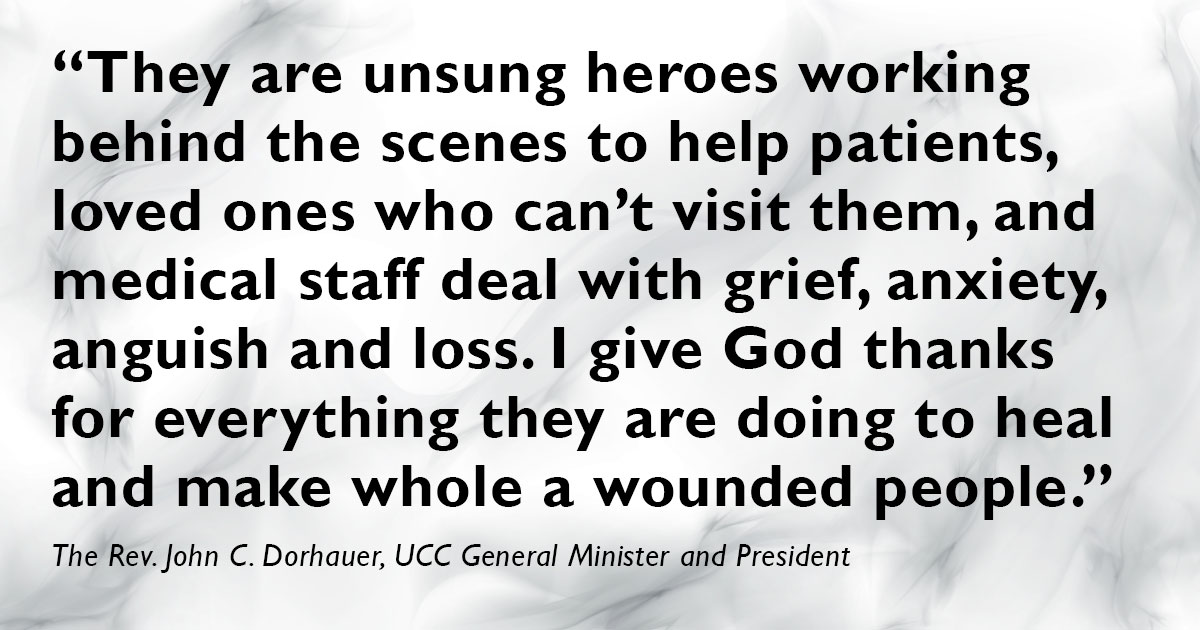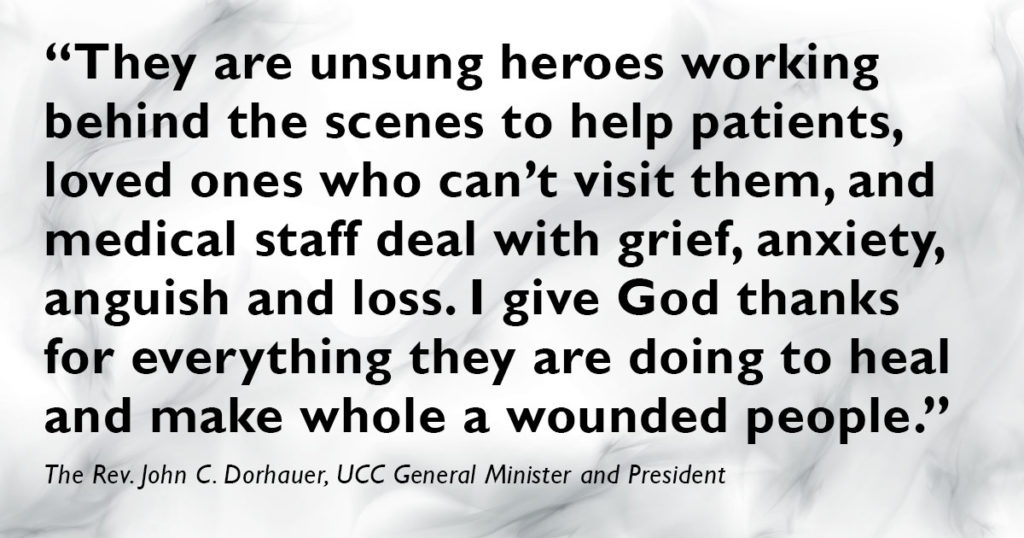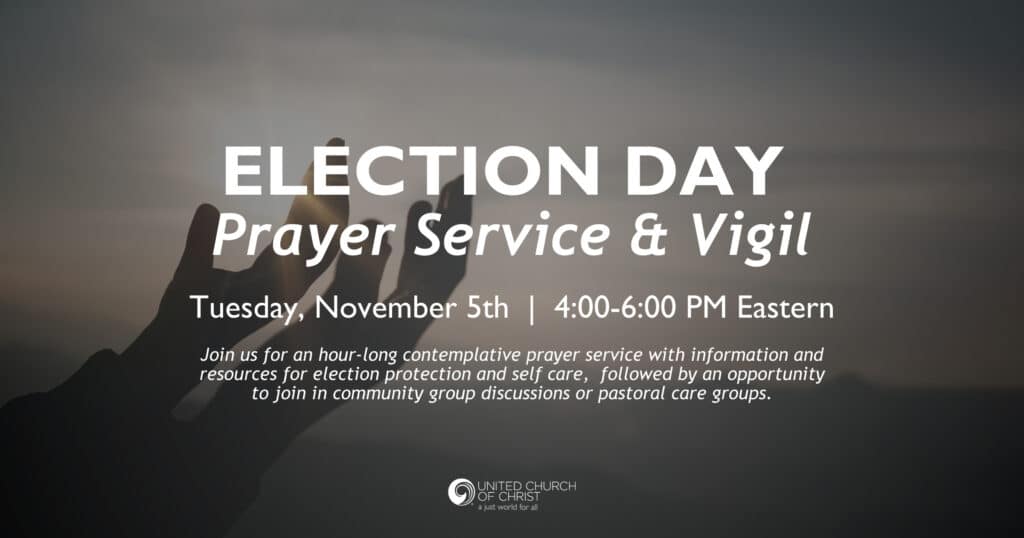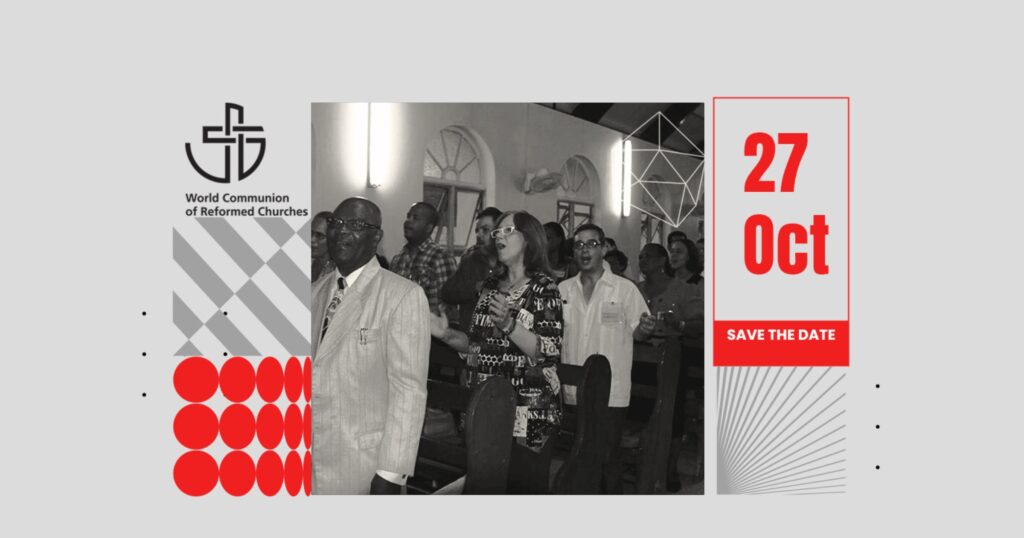UCC leadership lauds the chaplains as ‘unsung heroes’ of the pandemic
 In this country’s war against the coronavirus, there are hundreds of United Church of Christ clergy fighting on the front lines.
In this country’s war against the coronavirus, there are hundreds of United Church of Christ clergy fighting on the front lines.
They are chaplains, serving in hospitals, both large and small, in hospices, nursing facilities and V.A. health care centers. They minister in prisons, in the U.S. military on active duty, in the reserves and in the national guard.
“I tear up every time I think about what our chaplains are doing,” said the Rev. John Dorhauer, UCC general minister and president. “They are unsung heroes working behind the scenes to help patients, loved ones who can’t visit them, and medical staff deal with their grief, anxiety, anguish and loss. I want them to know I see them, and I give God thanks for everything they are doing to heal and make whole a wounded people.”
Over 400 UCC clergy are professionally endorsed for chaplaincy, board certified to serve in the clinical field as staff chaplains or pastoral educators. More than 70 others, with a government endorsement, serve the Air Force and Air Force Reserve, the Air National Guard, Army and Army Reserve, the Army National Guard, the Navy and Naval Reserve, Homeland Security, the Civil Air Patrol, the Department of Veterans Affairs and the Federal Bureau of Prisons. Still others serve with no required endorsement. In the 2019 UCC Yearbook, 850 UCC ordained ministers had a chaplain specialty code.
Ministering to patients, families — and, increasingly staff
During this time of COVID-19 many UCC chaplains find themselves ministering to and with essential first-responders. The Rev. Tina Campbell is one of them. In a video conversation with Dorhauer on April 16, she talked about how she’s engaged in the work of the church as the staff chaplain at Phoenix Children’s Hospital, painting a visual image of how drastically that has changed with the pandemic.
“The usual atmosphere of our hospital is it is actually a happy place, with 50 therapy dogs ministering to staff and children. Hundreds of visitors coming in and out of the hospital. Family and friends, people in the community, sports teams, theater troupes, all support the work of this hospital,” Campbell said. “Now the hospital lobby looks like a ghost town. Volunteers furloughed, no dogs coming in. And the biggest change, just one parent is allowed in the room.
“Parents are literally making life and death over the phone with very little privacy. There is truly nothing more difficult for human beings then to see their child at risk. That is acerbated at this time.”
Campbell, and other chaplains, help family members through pain and grief. Now much of that ministry also encompasses the hospital staff. Fighting a novel deadly disease, learning as they go, often with shortages of personal protective equipment.
The Rev. Stephen Boyd, UCC minister for chaplains and ministers in specialized settings, has spent the weeks since the beginning of this pandemic contacting our military, V.A. and prison chaplains. He said he’s learning through many of his conversations, that their situations are difficult. The UCC prison chaplain had to deal with a lockdown, with inmates confined to their cells, during a time of religious holidays, with Easter, Passover and Ramadan.
Chaplains get COVID-19 too
After speaking with V.A. chaplains, Boyd said that as in all hospital settings, “many patients are in palliative care, and dealing with end-of-life issues this makes the ministry even more challenging when family cannot be present for the patient. One of our chaplains at Stokes V.A. Cleveland had been exposed and was sent home for mandatory 14-day quarantine.”
The Rev. Jessica Chancey, a hospital chaplain who serves a facility in the Twin Cities area of Minnesota, was ill at the time of her video conversation with Dorhauer in April. She spoke of ministering to patients in the place of local church pastors, who are unable to visit. She said she sees herself, in many cases, as the bridge between the patient and their families who can’t come into the hospital. She is also pastoring to the staff, helping them through. “This is a scary time for them, so we are ministering to the people who are facing exposure every day.”
Chancey, who was waiting for the results of a COVID-19 test at the time of her video chat, said working in a risky environment didn’t dissuade her from her call. (Her test came back negative.)
“It’s what I signed up for,” she said. “I am putting myself where God called me. If nobody wanted to go to these hard places to serve, then these places would be harder. Part of the calling in chaplaincy is not to be comfortable, it’s not to be completely safe all the time; it’s to go out there and serve where the need is.”
Multiple duties for Guard and Reserve chaplains
“Many of our National Guard and Reserve chaplains serve in civilian hospitals or hospice settings and relay much of the same stories as Jess and Tina did in their interviews with John,” Boyd said. “Others of our National Guard and Reserve chaplains are in local churches and have been guiding their congregations through new ways to worship, communicate and socialize. Several of our National Guard and Reserve chaplains have been put on either state or federal alert in case they are needed to be activated to respond to the pandemic.”
During this stressful time, Boyd and many of the Conference ministers where the chaplains serve are connecting with these ministers through Zoom and conference calls on a regular basis to offer time for reflection, counseling, support and time of prayer together.
“I feel that it is important during this pandemic that our Conferences and Associations intentionally reach out and connect with their chaplains and specialized ministers,” said Boyd. “Often these ministers feel isolated because, due to their work schedules, they are not able to integrate fully into the local church membership. Therefore they do not have the strong relationship that they might like to have with a congregation. Conference and Association staff can step in and offer the time and support that these ministers need.”
Conference ministers, chaplains: ‘intense grief,’ mutual support
In the Southwest Conference, Campbell is one of 11 chaplains serving on the front lines, which the Rev. Bill Lyons, Conference minister, defines as in settings serving people with COVID19 diagnoses. In Arizona and New Mexico those settings include an adult correctional facility, hospitals, children’s hospital, hospice, long term care, and retirement communities.
“My years of training and experience in critical incident management told me that connecting our clergy in ways we’d not experienced before would be key to resourcing them to meet the extraordinary demands the pandemic would place on them and also to provide the deeper level of self-care needed when working in a prolonged crisis situation,” Lyons said.
“Chaplains and I meet every week by Zoom and in GroupMe conversation daily. Our ability to connect with immediacy has allowed us to pray for one another when one of our chaplains was isolated after several other chaplains in her department were diagnosed with COVID-19, offered me support when I learned my daughter, son-in-law and granddaughter had the virus, and give our chaplains instant opportunities to debrief after some of the most intense grief situations I’ve ever witnessed.”
‘We can’t afford to think too much’
Campbell appreciates Lyons’ “wonderful, weekly telephone calls” and his pastoral care. “That’s what the clergy needs right now is pastoral care. We can’t afford to think too much. We just need to suit up and show up. This is who we are. This is what we do. When something happens, we roll up our sleeves, we reach out to each other, we definitely have a no-whining rule. We keep each other going. We don’t know how to be anyone else.
“I see hope everywhere I look. I see people being kind to each other. I think we have seen the best of humanity in a very difficult time. We are finding ways … to see people at a social distance for mental and spiritual health. Frankly, I don’t think we give a second thought to what we are doing. Don’t need any doom and gloom right now. Need to be grateful for my ministry.”
“If I could offer a word of encouragement to our chaplains, I would say, ‘I see you. Thank you for your critically important work on behalf of the UCC,’” said the Rev. Elizabeth Dilley, who leads the Ministerial Excellence, Support and Authorization (MESA) Ministry Team. “Many of you are in places overwhelmed by COVID-19; many of you are working in places where censuses are far lower than normal due to other cutbacks. All of you have been affected by this pandemic, and all of you are caring for patients and staff in the midst of hard, heart-breaking decisions. The entire church stands with you and we pray that just as you offer the Spirit’s presence in these places, you will be refreshed by the Holy Spirit to continue your work. I am grateful for your courage and your faithfulness.”
Related News
UCC to offer Election Day Prayer Service and Vigil
On Election Day, Nov. 5, join the Rev. Karen Georgia A. Thompson together with United Church...
Read MoreGoing beyond the blessing: Churches emulate St. Francis’ care for animals
https://www.youtube.com/watch?v=lu3LYwhLxCo UCC News presents a video news story on the...
Read MoreUCC leaders invite all to global celebration of Reformation Sunday
This Reformation Sunday, leaders from the United Church of Christ will participate in a global...
Read More


